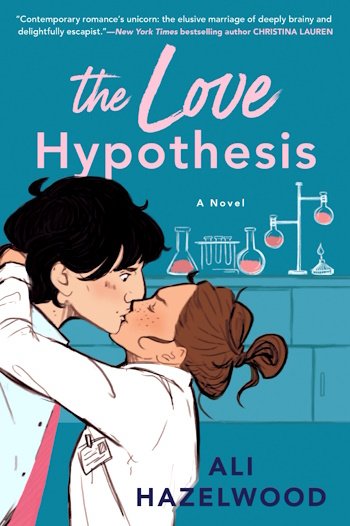He let go of her, and she realized that she’d been gripping his hand.
Oops.
“Are you planning to enroll?” he asked.
She shrugged. “I might not get an offer.” But she and the professor she’d interviewed with, Dr. Aslan, had really hit it off. Olive had stuttered and mumbled much less than usual. Plus, her GRE scores and GPA were almost perfect. Not having a life came in handy, sometimes.
“Are you planning to enroll if you get an offer, then?”
She’d be stupid not to. This was Stanford, after all—one of the best biology programs. Or at least, that was what Olive had been telling herself to cover the petrifying truth.
Which was that, frankly, she was a bit on the fence about this whole grad school thing.
“I . . . maybe. I must say, the line between excellent career choice and critical life screwup is getting a bit blurry.”
“Seems like you’re leaning toward screwup.” He sounded like he was smiling.
“No. Well . . . I just . . .”
“You just?”
She bit her lip. “What if I’m not good enough?” she blurted out, and why, God, why was she baring the deepest fears of her secret little heart to this random bathroom guy? And what was the point, anyway? Every time she aired out her doubts to friends and acquaintances, they all automatically offered the same trite, meaningless encouragements. You’ll be fine. You can do it. I believe in you. This guy was surely going to do the same.
Coming up.
Any moment now.
Any second—
“Why do you want to do it?”
Uh? “Do . . . what?”
“Get a Ph.D. What’s your reason?”
Olive cleared her throat. “I’ve always had an inquisitive mind, and graduate school is the ideal environment to foster that. It’ll give me important transferable skills—” He snorted.
She frowned. “What?”
“Not the line you found in an interview prep book. Why do you want a Ph.D.?”
“It’s true,” she insisted, a bit weakly. “I want to sharpen my research abilities—”
“Is it because you don’t know what else to do?”
“No.”
“Because you didn’t get an industry position?”
“No—I didn’t even apply for industry.”
“Ah.” He moved, a large, blurry figure stepping next to her to pour something down the sink. Olive could smell a whiff of eugenol, and laundry detergent, and clean, male skin. An oddly nice combination.
“I need more freedom than industry can offer.”
“You won’t have much freedom in academia.” His voice was closer, like he hadn’t stepped back yet. “You’ll have to fund your work through ludicrously competitive research grants. You’d make better money in a nine-to-five job that actually allows you to entertain the concept of weekends.”
Olive scowled. “Are you trying to get me to decline my offer? Is this some kind of anti–expired-contacts-wearers campaign?” “Nah.”
She could hear his smile.
“I’ll go ahead and trust that it was just a misstep.”
“I wear them all the time, and they almost never—”
“In a long line of missteps, clearly.” He sighed. “Here’s the deal: I have no idea if you’re good enough, but that’s not what you should be asking yourself. Academia’s a lot of bucks for very little bang. What matters is whether your reason to be in academia is good enough. So, why the Ph.D., Olive?”
She thought about it, and thought, and thought even more. And then she spoke carefully. “I have a question. A specific research question. Something that I want to find out.” There. Done. This was the answer. “Something I’m afraid no one else will discover if I don’t.”
“A question?”
She felt the air shift and realized that he was now leaning against the sink.
“Yes.” Her mouth felt dry. “Something that’s important to me. And—I don’t trust anyone else to do it. Because they haven’t so far. Because . . .”
Because something bad happened. Because I want to do my part so that itwon’t happen again.
Heavy thoughts to have in the presence of a stranger, in the darkness of her closed eyelids. So she cracked them open; her vision was still blurry, but the burning was mostly gone. The Guy was looking at her. Fuzzy around the edges, perhaps, but so very there, waiting patiently for her to continue.

























